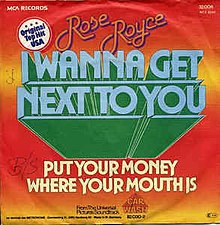
"TSOP (The Sound of Philadelphia)" is a 1974 recording by MFSB featuring vocals by The Three Degrees. It was written by Gamble and Huff as the theme for the American musical television program Soul Train, which specialized in African American musical performers. The single was released on the Philadelphia International Records label. It was the first television theme song to reach No. 1 on the Billboard Hot 100.

"Ain't Nothing Like the Real Thing" is a 1968 single released by American R&B/soul duo Marvin Gaye and Tammi Terrell, on the Tamla label in 1968. The B-side of the single is "Little Ole Boy, Little Ole Girl" from the duo's United LP. The first release off the duo's second album: You're All I Need, the song—written and produced by regular Gaye/Terrell collaborators Ashford & Simpson—became a hit within weeks of release eventually peaking at number eight on the US Billboard Hot 100 and number one on the Hot Soul Singles chart, the first of the duo's two number-one R&B hits. In the UK "Ain't Nothing Like the Real Thing" reached number 34.

"Drift Away" is a song by Mentor Williams, written in 1970 and originally recorded by British singer Mike Berry on his 1972 album Drift Away. A version by John Henry Kurtz was released two months later in November 1972. Mentor Williams was a country songwriter, and John Henry Kurtz was an actor and swamp rock singer. It was later given to soul singer Dobie Gray for whom it became a surprise international hit. In 1973, the song became Gray's biggest hit, peaking at number five on the US Billboard Hot 100 and receiving a gold certification from the Recording Industry Association of America (RIAA). The song has been covered by numerous musicians.
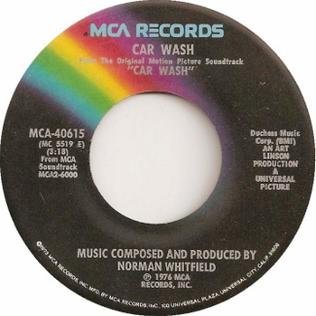
"Car Wash" is a song by the American soul and R&B band Rose Royce. Written and arranged by the ex-Motown producer Norman Whitfield, the song was the group's first single and one of the most notable successes of the 1970s disco era. "Car Wash", the theme of the 1976 film Car Wash, was Rose Royce's most successful single and the lead single from their first studio album, the Car Wash soundtrack. Reaching number one on the US Billboard Hot 100 and Hot Soul Singles charts, "Car Wash" also peaked at number three on the National Disco Action Top 30 chart and reached number nine on the UK Singles Chart in February 1977. The song was covered in 2004 by Christina Aguilera and Missy Elliott, who released their version as the single for the Shark Tale soundtrack.

"Since I Don't Have You" is a song written and composed by Jackie Taylor, James Beaumont, Janet Vogel, Joseph Rock, Joe Verscharen, Lennie Martin, and Wally Lester. It was first a 1958 hit single for the doo-wop group the Skyliners on the Billboard Hot 100. Country music singer Ronnie Milsap had a hit with the song in 1991. American hard rock band Guns N' Roses also had some success in 1994 with their version of the song which reached the top 10 on the UK Singles Chart.

"I'll Never Fall in Love Again" is a popular song by composer Burt Bacharach and lyricist Hal David that was written for the 1968 musical Promises, Promises. Several recordings of the song were released in 1969; the most popular versions were by Dionne Warwick, who took it to number 6 on Billboard magazine's Hot 100 and spent three weeks topping the magazine's list of the most popular Easy Listening songs, and Bobbie Gentry, who topped the UK chart with her recording and also peaked at number 1 in Australia and Ireland, number 3 in South Africa and number 5 in Norway.

"Urgent" is a song by the British-American rock band Foreigner, and the first single from their album 4 in 1981.

"Don't Give Up on Us" is a hit song recorded by American-British singer David Soul, and written by Tony Macaulay.

"Every Time I Think of You" is a song written by Jack Conrad and Ray Kennedy and released in December 1978 as the lead single from The Babys' third studio album Head First; John Waite provided lead vocals, featuring female vocals by Myrna Matthews. The track was a worldwide hit, and became their last top 20 in the United States.
"Muskrat Love" is a soft rock song written by Willis Alan Ramsey. The song depicts a romantic liaison between two anthropomorphic muskrats named Susie and Sam. It was first recorded in 1972 by Ramsey for his sole album release Willis Alan Ramsey. The song was originally titled "Muskrat Candlelight" referencing the song's opening lyric.
Ronald Dyson was an American soul and R&B singer and actor. He had a lead role in the Broadway production of Hair and scored a top ten single in 1970 with "(If You Let Me Make Love to You Then) Why Can't I Touch You?"
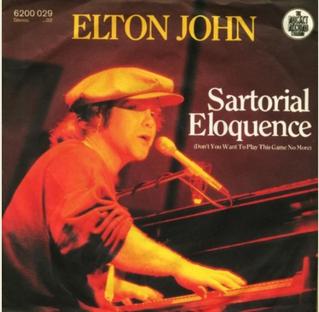
"Sartorial Eloquence" is a song by English musician Elton John with lyrics written by Tom Robinson. It is the third track of his 1980 studio album, 21 at 33. In the UK, it was issued as "Sartorial Eloquence", and in the US as "Don't Ya Wanna Play This Game No More?". It reached No. 39 on the Billboard Hot 100 and No. 45 Adult Contemporary, falling just short of the Top 40 in the UK (#44), and making lesser showings in Canada (#57) and Australia (#91).

"How 'Bout Us" is the most successful single released by R&B music group Champaign. Composed by band keyboardist Dana Walden and originally released on the band's debut album How 'Bout Us, the title track peaked at number 12 on the Billboard Hot 100. A romantic ballad, the song was released on Valentine's Day, 1981.

"With You I'm Born Again" is a 1979 duet written by Carol Connors and David Shire that originated on the soundtrack of the 1979 motion picture Fast Break. It was performed by Motown recording artists Billy Preston and Syreeta Wright and became an international hit for the duo, reaching number four on the Billboard Hot 100 and number two on the UK singles chart.

Love Story is the twenty-seventh studio album by American pop singer Andy Williams that was released on February 3, 1971, by Columbia Records. This was another in his series of cover albums, but the title track, subtitled "Where Do I Begin", was the one song included that he originated.
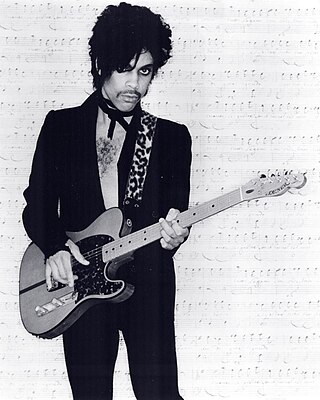
Prince released several hundred songs both under his own name and under pseudonyms and/or pen names, as well as writing songs which have been recorded by other artists. Estimates of the actual number of songs written by Prince range anywhere from 500 to well over 1,000. He has released 117 singles, 41 promotional singles, 24 internet singles, and eight internet downloads.
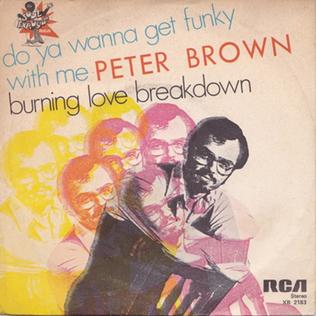
"Do Ya Wanna Get Funky with Me" is a 1977 single recorded by Peter Brown. The record sold more than one million copies. It was his first hit song. Backing vocals were provided by Wildflower.
"Swayin' to the Music (Slow Dancin')", initially titled "Slow Dancing", is a song written by Jack Tempchin. Under the title "Slow Dancing", the song originally was a minor US hit in 1976 for the band Funky Kings (of which Tempchin was a member). The song became much better known as "Swayin' to the Music (Slow Dancin')" in a 1977 cover version by Johnny Rivers, which became a top ten US hit. It was Rivers' last Top 40 hit in the United States, and became his second Gold record.

"The Things We Do for Love" is a song by British band 10cc, released as a single in 1976. It later featured on the album Deceptive Bends released in 1977 and was the group's first release after the departure of band members Kevin Godley and Lol Creme.

"Really Wanna Know You" is a 1981 song by Gary Wright that was a hit single in the U.S., reaching No. 16 on the Billboard Hot 100. It was taken from the album The Right Place. The song spent 17 weeks on the chart and became Wright's third biggest U.S. hit. It was his final charting single.
